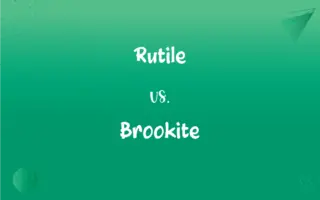Wit vs. Humor: What's the Difference?
By Janet White || Published on February 14, 2024
Wit involves clever and quick mental responses; humor is the quality of being amusing or comic.

Key Differences
Wit is characterized by mental sharpness and the ability to deliver clever, often impromptu responses. In contrast, humor is a broader concept encompassing anything that causes laughter or amusement.
Wit often relies on quick thinking and a keen understanding of language to create amusing remarks. Humor, however, can include a wide range of comedic styles, from slapstick to sophisticated irony.
The essence of wit lies in its brevity and the use of language to create clever puns or wordplay. Conversely, humor may not always depend on language and can be found in situations, characters, or visual gags.
Wit is typically seen as more intellectual and refined, requiring knowledge and insight to appreciate. Humor, on the other hand, can appeal to a broader audience and may not require any specialized knowledge.
Wit often involves a sense of surprise and unexpectedness in its delivery, while humor can be predictable yet still enjoyable, relying on familiar comedic tropes or scenarios.
ADVERTISEMENT
Comparison Chart
Definition
Clever and quick mental responses
Quality of being amusing or comic
Dependency
Relies on language and intellectual play
Can be non-verbal, broader in style
Audience
Often intellectual, requiring insight
Appeals to a broad audience
Nature
Brief, sharp, often impromptu
Can be predictable, varied in forms
Focus
Language cleverness, puns
Situational, character-based, visual gags
ADVERTISEMENT
Wit and Humor Definitions
Wit
Wit is a form of intelligent humor that involves clever remarks.
She displayed her wit during debates with sharp retorts.
Humor
Humor is the quality of being funny or comical.
His sense of humor was infectious, always making people laugh.
Wit
Wit refers to quick and inventive verbal humor.
His wit made even the dullest meetings entertaining.
Humor
Humor refers to anything that causes amusement or laughter.
The movie was full of humor, from slapstick to clever jokes.
Wit
Wit is the ability to use words cleverly and amusingly.
Her wit shone when she quipped about the irony of life.
Humor
Humor involves creating and appreciating amusing situations or jokes.
His humor lightened the mood of the entire room.
Wit
Wit involves the skillful use of language for comedic effect.
His wit was evident in his clever wordplay.
Humor
Humor is the ability to see or show the funny side of things.
Her humor helped her cope with difficult situations.
Wit
Wit is a mental sharpness and inventiveness used to amuse.
Her speech was filled with wit, captivating the audience.
Humor
Humor can be a mood or state of mind characterized by amusement.
She took the mishap with good humor.
Wit
The natural ability to perceive and understand; intelligence.
Humor
The quality that makes something laughable or amusing; funniness
Could not see the humor of the situation.
Wit
Often wits Practical intelligence; shrewdness or resourcefulness
Living by one's wits.
FAQs
Do you need to be intelligent to understand wit?
Understanding wit often requires some level of intelligence and cultural knowledge.
What defines wit?
Wit is defined by mental sharpness and the ability to make clever remarks.
How is humor different from wit?
Humor is a broader concept that includes anything causing amusement, not just verbal cleverness.
Can wit be planned?
Wit is often spontaneous, but it can also be planned as part of written dialogue.
Can humor be visual?
Yes, humor can be visual, like in cartoons or slapstick comedy.
Is wit always appreciated?
Wit is not always appreciated, especially if it comes across as sarcasm or insensitivity.
Does wit involve puns?
Wit often involves puns, wordplay, and clever use of language.
Can humor be used in education?
Yes, humor can be an effective tool in education to engage and interest students.
Is humor always funny?
Humor is subjective; what is funny to one person may not be to another.
Can humor be found in everyday life?
Yes, humor can be found in various aspects of everyday life, from conversations to situations.
Can wit be offensive?
Wit can sometimes be offensive if not used carefully, especially in sensitive contexts.
How does humor affect mood?
Humor can positively affect mood, reducing stress and increasing happiness.
Is wit important in social situations?
Wit can be valuable in social situations, enhancing conversations and connections.
Is humor important in culture?
Humor plays a significant role in culture, shaping entertainment, communication, and social interactions.
Are humor and comedy the same?
Comedy is a genre that uses humor as its main tool to entertain.
Is wit a natural talent or a learned skill?
Wit can be a natural talent, but it can also be honed and developed.
Can wit be too subtle?
Yes, wit can sometimes be too subtle, leading to misunderstandings or being overlooked.
Is wit common in literature?
Yes, wit is a common element in literature, used to add levity or highlight intelligence.
Does humor vary across cultures?
Humor varies significantly across cultures, with different societies finding different things amusing.
Can humor be therapeutic?
Humor can have therapeutic effects, helping people cope with difficult situations.
About Author
Written by
Janet WhiteJanet White has been an esteemed writer and blogger for Difference Wiki. Holding a Master's degree in Science and Medical Journalism from the prestigious Boston University, she has consistently demonstrated her expertise and passion for her field. When she's not immersed in her work, Janet relishes her time exercising, delving into a good book, and cherishing moments with friends and family.







































































